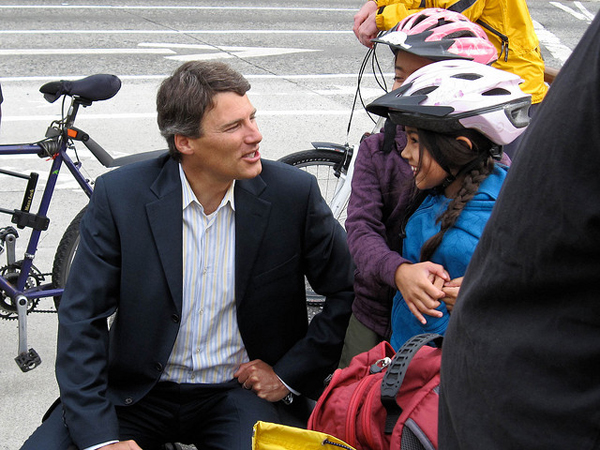
It's four days into the Velo-City Global conference on making the world a better place for bicyclers, which in turn is presumed to make the world a better place overall. In covering the Vancouver confab, I've found an unassuming little room which I've used all week as my private interrogation chamber. Today's hunt yields six or seven of the world's leading thinkers on cycling. The menu of accents includes Australian, British, Danish and German. Melting ice water forms sweaty beads on the outside of the steel jug in the center of the crowded table. We're all sweating too. No you can't open the door. And yes, of course I have more questions. Some 30 minutes in, my captors finally break and spill the big secret. The cardinal rule of cycling advocacy sounds like something said in a David Fincher film: never talk about cycling advocacy.
"We should not make this the battle against the car," starts Steen Moller, mayor of culture and urban development in Denmark's city of Odense. "Then we will lose. All of us. We should make this a battle for our children. A positive message, not a negative message."
I roll my eyes in theatrical fashion.
"You know, in Copenhagen, we're not cyclists. We're just Copenhageners doing the obvious thing, which is cycling, because we have the infrastructure," Niels Torslov insists. He's director of the traffic department at the City of Copenhagen and chair of a working group on cycling safety at the Paris-based Organisation for Economic Co-operation and Development.
Must be nice, I mutter. But we're clearly not on the same page. Whenever I open my mouth about cycling, people outside of this room still think of adrenaline junkies screaming down mountains or Lycra-clad sadists crawling up the other side of those mountains on state-of-the-art machines worth more than your fancy suits. Cycling, at least in Vancouver, remains stuck in the sports paradigm. The whole concept of utility riding, of the bicycle as a tool, is still very new for most of us. And no matter how hard you stress the cultural, economic, environmental or health benefits of cycling, taking road space away from cars is not a popular affair. Oh and I still don't see what children have to do with any of this.
For the kids
Torslov grins and lets me finish my rant, then drops an innocent-sounding one-liner:
"But it's very sad children are not allowed to go play on the streets, not allowed by their parents because they think it's dangerous."
Suddenly I find myself smiling too. It's an impressive little scheme he's cooked up: you may always find opponents of cycling, but what asshole is going to oppose making cities safer for children?
"The media gets it!" someone exclaims. I puff out my chest, proud to be representing all of the city's reporters, who have been inexplicably AWOL for four days now. I hope they're okay.
Paul Tranter jumps in. An animated geography professor and author from Canberra, Australia, he's equally keen to make the world better for cyclists by tricking parents into thinking he's actually just making it better for their children.
"If you drive your children to school to save time, you're forcing yourself into spending the rest of the week driving them everywhere because you're making the whole neighbourhood too dangerous," he says. "So you drive them to school, drive them to the store, drive them to a friend’s, drive them to the cinema, drive them to the doctor, drive them to a psychologist. If we can switch to walking, cycling and public transport, we'll save the government heaps of money, not just in transport, but also in health costs."
But we're going to do all this without talking cycling? I say, dubious.
"If you just talk about cycling, it gets lost," admits Kevin Mayne, development director at the European Cyclists' Federation and a man whose native England still suffers from the same anti-cycling sentiment we enjoy in Vancouver. "But If you talk about, we want more money in the city, we want less congestion, we don't particularly want various other negative things, pollution, this kind of stuff, you wind up at cycling. The things people will vote for will not be cycling. They will vote for clean cities, less congestion, less pollution, less noise, safe children."
This is a clever extension of the "cycling for democracy" argument I heard the conference's head cheerleader preach all week. Also executive director of Canadian non-profit 8-80 Cities, Gil Penalosa tried to sell me on the idea like this: cycling infrastructure is not only a safety tool, it's the great social equalizer, reaching beyond the rich-versus-poor dichotomy. The only individual mode of mobility for all children and youth in Vancouver is the bicycle, he argued. So is it that only people who have access to driving a car have a right to individual mobility? If all Canadians are equal, as per our country's great constitution, why can't we show them all the same respect on the road? That respect, Penalosa argued, is best shown via protected bike lanes and streets calmed to car traffic.
The trouble with symbolic gestures
It all sounds so beautiful and progressive and self-evident that it's only natural my captors squirm at the next words out of my blaspheming mouth: what if this whole conference is a waste of time because it's just another insular gathering of the converted?
"But we have signed the charter. Now it's in the world! I think that's the most important thing!" fires back Manfred Neun, the bearded and perpetually grinning German president of the ECF.
What the hell are you on about? I venture, confused.
"The Charter of Vancouver!" he yells, equally puzzled.
Damn. I'm forced to confess I spent the entire morning in the lobby arguing with people over helmets -- as per Vancouver tradition -- and so missed their final keynote address. Someone slides a copy of the document my way. It's predictably formal and bureaucratic, but includes a few gems. Here's the best part:
"The undersigned, on the occasion of the Velo-city Global 2012 conference in Vancouver, call on the United Nations and all governmental, intergovernmental and non-governmental organizations and institutions to a) adopt a goal to improve the situation of children around the world in part through sustainable transport policies and strategies and b) include cycling as part of all sustainable transport policies and strategies."
"The United Nations, eh? Not bad! Will this hold up in court?" I say.
There's silence and uncomfortable shuffling. I take that as a no.
"Does this thing have any teeth at all or will it meet the same fate as the Earth Summit in Rio?" I press.

"Symbolically, for North Americans to make a statement..." starts Neun. "The fact that Vancouver makes a declaration about its children, that doesn't do us any harm. If this city, signed by the mayor, takes serious that cycling for children is a very important thing..."
"Stop right there," I interrupt.
Also symbolically, I'd like to point out Mayor Gregor Robertson's signature doesn't actually appear anywhere on here. And while I'm sure Councilor Tony Tang is equally skilled at signing things, I don't know him as a vocal cycling advocate.
Neun, now on autopilot, continues untroubled: "We need our cities for people..."
Frustrated I set them all free. Relieved, they shake hands and smile. Some hug. Others pat each other on the back. Another Velo-city in the history books.
I leave the hotel feeling strangely fine despite the poison the Europeans have been feeding me all week. Sure, my image of Vancouver as the world's cycling capital is dead, but when has there ever been a revolution without struggle?
Get up and ride, boys and girls. It's the best thing you can do for your health, your wallet and your community. But remember, you're not cyclists. You're just people using bikes as tools, same as you do with toasters and socket wrenches. That should put an end to all this special interest bullshit and move the conversation into the mainstream.
Oh and maybe this doesn't matter so much, but I'm still troubled by our bike-loving mayor skipping out on the old charter song and dance. I realize he's busier and far more important than I am, but still I'd like to know what kept him. Now two weeks and multiple interview requests later, he has yet to call back. I hope he will soon. For the children. ![]()
Read more: Transportation, Environment, Urban Planning + Architecture















Tyee Commenting Guidelines
Comments that violate guidelines risk being deleted, and violations may result in a temporary or permanent user ban. Maintain the spirit of good conversation to stay in the discussion.
*Please note The Tyee is not a forum for spreading misinformation about COVID-19, denying its existence or minimizing its risk to public health.
Do:
Do not: